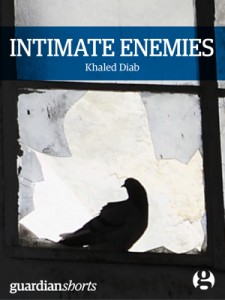Palestinians and Israelis: Intimate enemies, future friends
By Khaled Diab
As I cycle amid the growing cycle of violence, I believe peaceful coexistence between Israelis and Palestinians is plausible and possible.
Friday 21 November 2014
I prefer to do the school run by bicycle. While this is unremarkable in any bike-friendly European city, here in Jerusalem it is a different matter, and not just because of the manic traffic and steep inclines.
As the situation in the Holy City speeds along the fast lane downhill, taking the slippery slope towards the abyss, when my son is with me, I too am slowly beginning to succumb to the mass fear gripping both Arabs and Jews. What will happen if Israeli extremists overhear us speaking Arabic to each other? What if Palestinian extremists mistake us, a darkish man with a blond son, for Jews?
This week's deadly and reprehensible attack against defenceless worshippers at a Jerusalem synagogue, alongside the ongoing attacks against Palestinians by settlers and ultra-nationalists has further reduced the sense of safety and any residual mutual trust in this bitterly divided city. Incitements by extremist elements in the Israeli government and Hamas are stoking the fire further.
Since the summer of hate erupted, many Palestinian Jerusalemites I know no longer venture into West Jerusalem and some who worked for Israeli companies have quit their jobs or are considering it. Similarly, even many of the Israeli Jerusalemites who used to go to the Arab neighbouhoods of East Jerusalem have stopped doing so.
As the situation continues on its collision course, it is hard to imagine that people in this fractured city once lived differently – at a time when there were no walls and fewer psychological barriers.
But older people recall a time – before Oslo and the first intifada – when Jews and Arabs visited each other's neighbourhoods unselfconsciously and even the West Bank and Gaza were open, with two-way traffic. Difficult as it is to conceive today, both Palestinians and Israelis used to head to Gaza to enjoy its cuisine, beaches and cheap shopping.
Go even further back, and the very oldest Jerusalemites recall a time when Arabs and Jews lived side by side, when the different religious communities shared in one another's festivities, and all enjoyed the magic of the Egyptian silver screen during its reputed golden age at the local cinema, as my 92-year-old Palestinian neighbour is fond of reminiscing.
And that is not all. Despite their bitter political differences, Israelis and Palestinians are, I have found after living among them for some three years, more alike than they like to admit or are aware.
Two Jerusalemites embody this symmetry in a symbolic, even poetic fashion. The late Palestinian-American academic, musician and activist Edward Said and Israeli novelist and activist Amos Oz shared, unbeknownst to each other, the peculiar fantasy of metamorphosing into a book “whose fate I took to be happily free of unwelcome changes”, imagined Said, and who “would have a better chance of survival”, in Oz's words.
But the similarities and parallels aren't confined to the imaginary sphere, they also occupy the real world.
Palestinians and Israelis share a similar Mediterranean outlook, characterised, among other things, by the central importance of family, child-friendliness and the casual attitude to regulations, from smoking to driving. In culinary terms, this is reflected in the Israeli love of hummus and the Palestinian infatuation with schnitzels.

Order here
Collectively, both societies are highly traumatised. Israelis live with the memory of the Holocaust and the almost wholesale disappearance of Jewish communities in much of Europe and the Middle East, while Palestinians live under the shadow of the Nakba, the loss of Palestine and the ongoing occupation.
Politically too, the two societies have seen an almost symmetrical swing from leftist, secular nationalism towards right-wing, religiously flavoured populism.
All these commonalities, and the fact that the differences within each society is greater than the divergence between them, is why I call Israelis and Palestinians “intimate enemies” in my new book of the same title.
The book digs beyond the politics to unearth the people, the human reality obscured by the fog of war. In it, I also explore creative ways out of the quagmire, namely a civil rights struggle, what I call the non-state solution and the launching of a people's peace process.
Impossible as it seems today, peace and coexistence are possible but getting there requires a radical rethinking of each side's priorities, aspirations and narratives.
This article first appeared in Italian in Corriere della Sera on 20 November 2014.
____
Intimate Enemies: Living with Israelis and Palestinians in the Holy Land
By Khaled Diab
Published by Guardian Shorts, October 2014, http://guardianshorts.co.uk/intimate-enemies/
More info on Intimate Enemies: news, views and reviews


